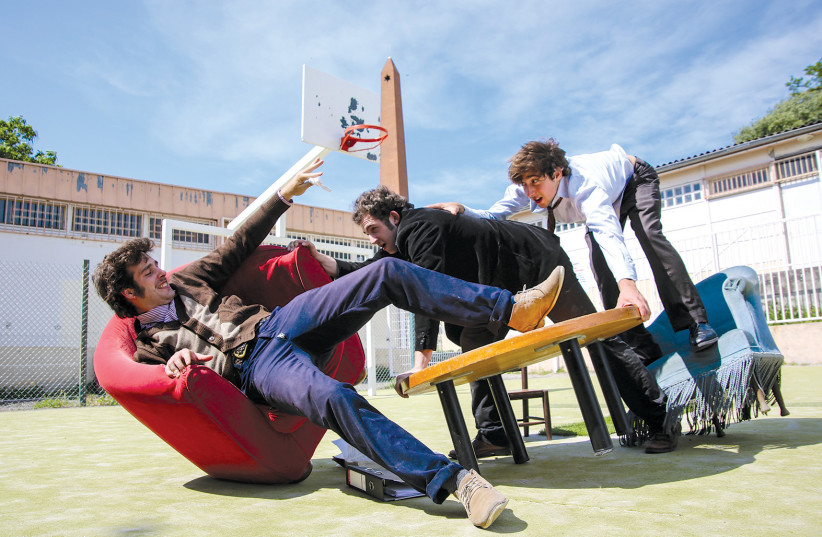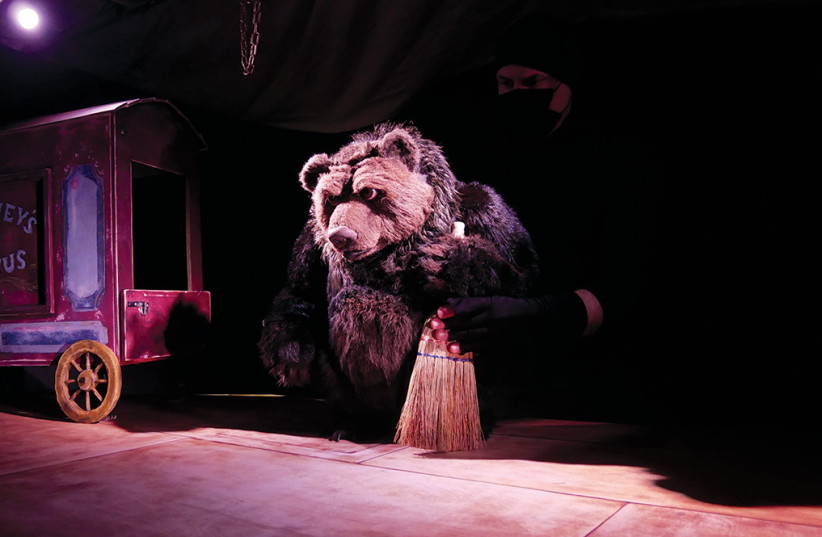If, for argument’s sake, you happen to hail from the British Isles and are of a certain vintage, your idea of puppet theater may be limited to childhood memories of Punch and Judy shows on the beach during your summer holidays. To say this art form has come on in leaps and bounds since that quintessentially British seaside entertainment offering would be the understatement of this, or any other, century.
That is abundantly clear when one runs an eye down the lengthy and multifarious roster of shows on offer at this year’s Jerusalem International Puppet Festival at the Train Theater and the Liberty Bell Garden, August 13-17.
Moran Duvshani, whose If The World Was A Child work premieres at the festival, is fully on board the multidisciplinary mindset, 32 full years after the annual event sprang into a fun and engaging life. She evokes a different area of the arts to make her point. “It’s like contemporary music which hardly has any melody,” she notes, referencing rap. “Contemporary puppet theater hardly has any puppets.” That may sound like a blatant contradiction in terms, but it is an accurate appraisal of the current state of presentational affairs in the sector.
That eclectic avenue of thought prevails across the scores of creations from here and overseas, with all kinds of objects, robots, screened images, and actual human beings featuring in the production lineups. “Very few artists today sit at home and sew puppets together,” Duvshani observes.
More’s the pity one might opine, particularly if they belong to the golden age stratum of society. That stick-in-the-mud idea should be well and truly put to bed by a visit to the Puppet Festival. If The World Was A Child is a classic case in point.

If anyone is equipped to create and proffer a show that encompasses various disciplines and presentational formats, it is Duvshani. Over the past decade and a half, the 38-year-old artist has worked as a street performer around Europe, conceived and spearheaded all sorts of projects in educational frameworks for children and adults alike, as well as devising material for people of all ages with special needs. Performance theater also comes into the expansive Duvshani purview, as do creative workshops, serving as an artistic director, and creating intriguing and alluring puppet theater.
She and her team have certainly had their noses to the grindstone to make sure the festival folk get their money’s worth on August 14 and 15. “We started working on it in November,” she says. The rest of the first-person plural epithet refers to the cast of four 10-year-olds who do the onstage business. With Duvshani’s background of working with special-needs groups, I wondered whether the junior thespians were also categorized as such, in strictly official terms. “We all have special needs,” she fires back at me.
While I concurred she was spot-on, there is still a recognized sociological classification that most people would understand as relating to children and adults with certain physical and/or intellectual challenges. “No, these children do not have special needs in that sense,” she relents. It is, she explains, very much a matter of going with the natural personal flow.
Children and performance theater
NOT EVERYONE, it must be said, is into performance theater. Some, indeed, may wonder what the discipline is all about. Didn’t William Shakespeare sagely observe that “All the world’s a stage.” If that is the case – and who are we to argue with the celebrated Bard? – then, surely, every act, every mannerism, every word spoken can fall into that artistic bracket.
But children are a different thing. Yes, they begin to ape their seniors at a very young age and that, to some extent or other, probably informs how we express ourselves for the rest of our lives. Even so, it is likelier that you will get a less formulaic, more honest, rendition from kids who have yet to entirely adapt to accepted societal airs and graces. “The children don’t act in a play. They don’t present characters. They are themselves.” Duvshani says. “They bring themselves to the stage in all sorts of ways. They tell their stories, what has happened to them, their feelings, and turn them into images and actions through stories and everyday objects which turn into fantastic things.”
As the brains behind a junior venture, Duvshani says she had to tread a fine line between telling the youngsters what to do and how to do it, and standing to one side letting them just do their thing. This is a collaborative effort. “We let them create the show and follow their own process. They are full partners in the creative process, and I supported them in doing that.”
That may sound like a trying balancing act for someone who is used to keeping their hands firmly on the creative rudder. But Duvshani says making her debut with kids offered its own special rewards, particularly as she gave them their heads. “If I had worked on this with a team of adults, I think it would have been much more difficult. But these are children creating something for their peers, for audiences their own age.”
The festival website notes that the show is suitable for children from the age of seven. “Children have fewer masks and haven’t yet had their wings clipped or had defined patterns of behavior dictated to them,” Duvshani states.
IT CAME as no surprise to learn that If The World Was A Child is a lo-tech piece, with director Nurit Drimmer coming on board at a later stage, and Guy Scharf scoring and overseeing the musical stratum. The junior cast members also fashioned most of the props themselves. Sounds like an appealing prospect, for anyone over the age of seven, adults included.
Embracing an artistic disciplinary crossover approach
Train Theater artistic director Shahar Marom fully embraces the disciplinary crossover approach to what constitutes puppet theater today.
“What was once all about puppets, which were very impressive, in 2023 we are talking about a much broader field. The world has changed so much over the years.” That, he says, has generated new areas of interest and new ways of drawing us into the onstage plot. “These days, puppet theater incorporates robotics and computers and sound – all sorts of things that are not done by people on a stage.” That doesn’t mean humans – at least in this area of the arts – are gradually becoming redundant. “People can bring inanimate objects to life,” Marom continues.
The more technophobically-leaning among us may shirk at the thought of robots treading the boards, but the Train Theater head advises that entertainment has not exactly been an au naturel sphere since the dawn of time. “Back in the day of Punch and Judy, it was very modern to use puppets and marionettes. It was just mechanical. That was the world back then.” The man has a point.
Indeed, rather than technological golems replacing human beings, with all their gifts, acquired skills, and foibles, he says that, increasingly, live performers are finding ways to collaborate with the fruits of hi-tech designs. It is a matter of keeping one’s ear to the ground and ensuring a wholesome complementary equilibrium between the two seemingly diametrically opposed means of artistic expression.

As an artist who keeps tabs on global developments in the field, Marom was keenly aware of that ethos as he compiled the program for the five-dayer. He cites a work conceived and choreographed by Ofir Yudilevitch called Hands Up. That may sound like we are in for a showdown somewhere in the vicinity of the Last Chance Saloon, with all guns blazing, but in fact the title indicates the gymnastic feats performed by Berlin-based British co-creator Imogen Huzel. The highly visual comedic plot has circus artist Huzel trying numerous approaches to getting her handstands down pat.
The corporeal element is augmented by objects of various guises and stages of technological evolution. Therein, suggests Marom, lies the essence of the human-manmade interface. “There is an artist – the world’s leading handstand artist – who performs almost the whole show on her hands. She tells a story while she does that. And there is a robot which also does handstands. So you have a human being, with all her amazing abilities, performing puppet theater, and the abilities of a machine in tandem.”
It is, he says, something of a leitmotif in this year’s rollout. “The festival has a large number of productions in which human ability is taken as far as it can go. There is a recurring question about where the human element comes into play.” That suggests that the latter delineation is in a constant state of flux, and that the discipline, and the interplay between humans and machines, will continue to evolve. One wonders whether, with the increasing use of AI in the way the world operates, the lines may, at some stage, begin to blur. Let’s hope that doesn’t go past the point of no return.
Marom cites more in the way of impressive corporeal endeavors in the pursuit of entertaining excellence. “There is a show for adults called Revolver in which the circus artist spins for 45 minutes.” That sounds like a dervish-style delivery. “Yes, it is a bit like a dervish, but she does all sorts of things while she rotates – she changes costumes, operates objects. It is fascinating. It is a person trying to find their place in the world. Even with all the technology, it is about a human defining their place within all this technology.”
The artist in question is French-domiciled Danielle Allouma, who created Revolver together with Nir Jacob Younessi, and specializes in body spinning techniques while rhythmically and lyrically exploring the body’s limitations and capabilities.
PAST PATRONS of the festival will be aware that puppet shows are not the exclusive domain of the youngster crowd, and there are plenty of adult-oriented offerings in the lineup. Don’t Poke the Bear, courtesy of the Tel Aviv-based Key Theatre company, which opens the programmatic proceedings on August 13, is one such offering. The wordless show tells the story of a circus bear, warts and all – glitter, human cruelty, and unrequited love included.
For the past seven or eight years, the Puppet Festival has offered engaging al fresco activities and entertainment in the Liberty Bell Park. This year’s multidisciplinary outdoor event goes by the name of Shikshukalem, which, no doubt, Hebrew speakers will note rhymes with Yerushalayim (Jerusalem), give or take a syllable.
The fantasy world created by Marom and Dafna Kron invites visitors to wander among the creations and experience a manifold spread of puppet theater, art installations, dance, sound, performance, and more. Shikshukalem comes equipped with all kinds of weird and wonderful and thoroughly entertaining pop-ups, such as a weeping tower – in place of meteorological precipitation – and a coffee shop serves tunes instead of coffee and macaroons. It has a garrulous train instead of streets with cars, and the thoroughfares are lined with dancers rather than concrete or cement. Oh, and the more artistic or anarchic among us will have carte blanche to embellish the “city” walls with graffiti.
To paraphrase a prophetic observation by a certain Mr. Herzl – if you will it, it is no dream. ❖
For tickets and more information: traintheater.co.il/en/festival/2023
